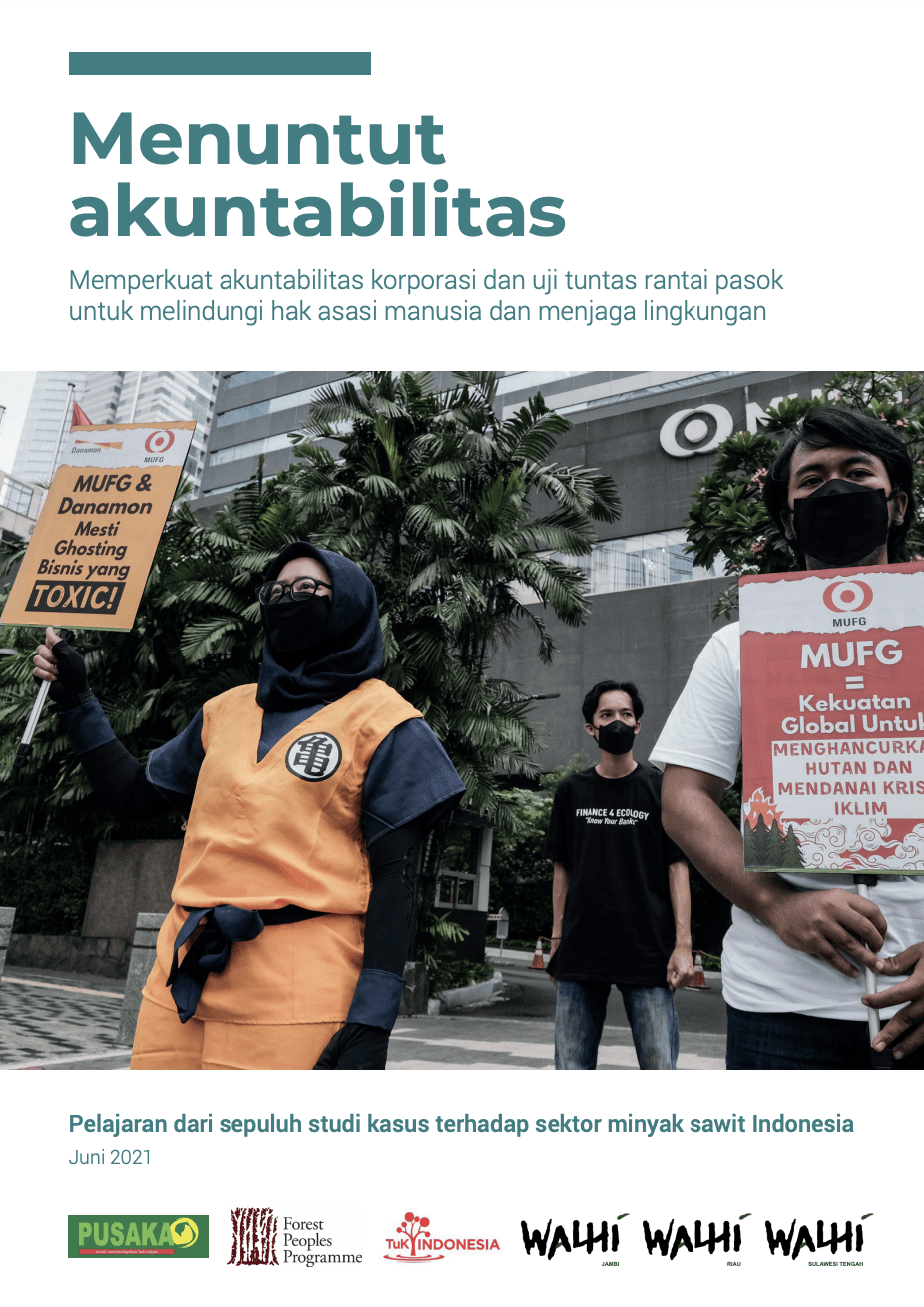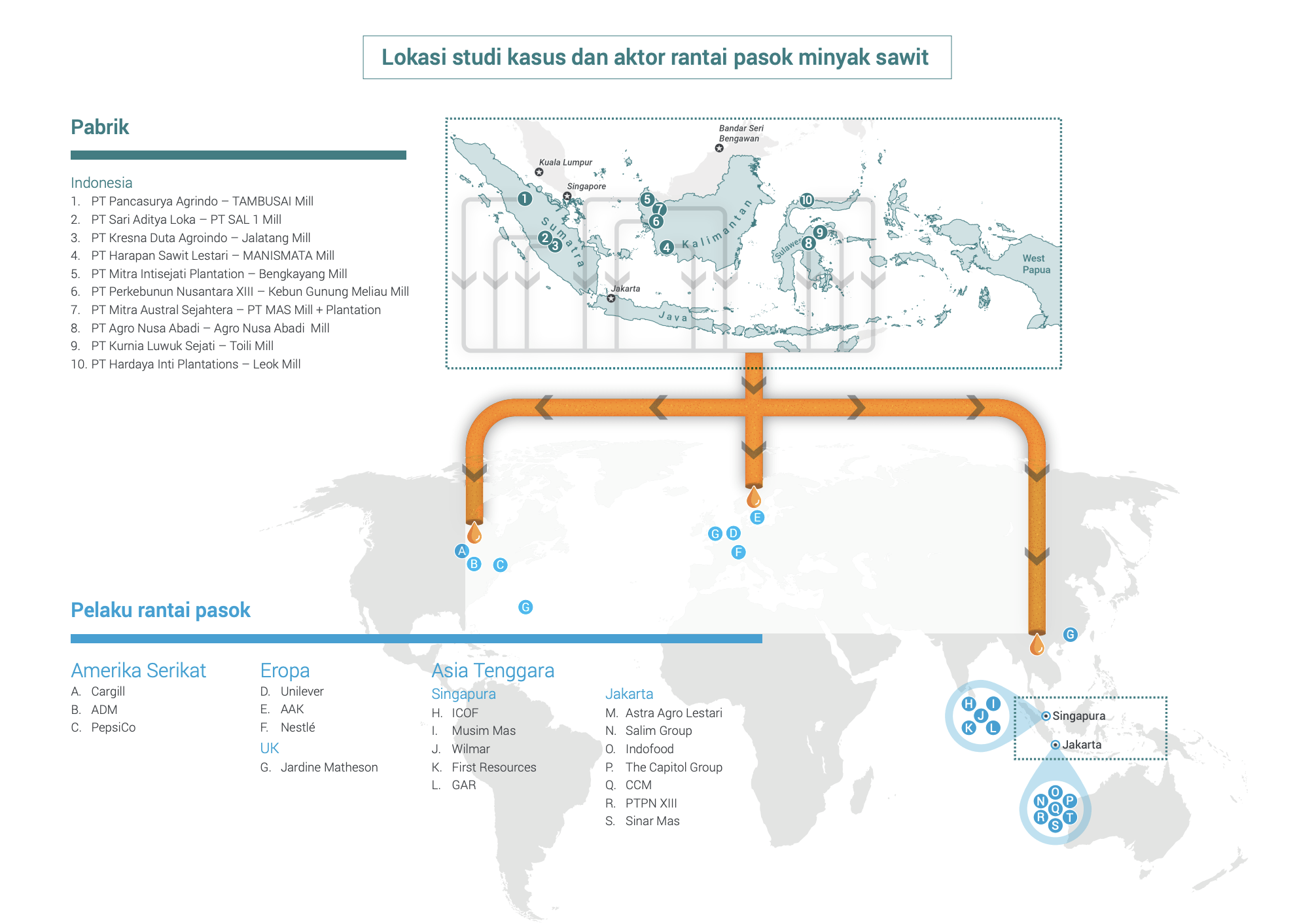16 Juni 2021 4 menit
Menuntut akuntabilitas

Menuntut akuntabilitas
Memperkuat akuntabilitas korporasi dan uji tuntas rantai pasok untuk melindungi hak asasi manusia dan menjaga lingkungan
Laporan ini didasarkan pada tinjauan cermat terhadap hubungan antara sepuluh perkebunan kelapa sawit kontroversial di Indonesia dan perusahaan-perusahaan yang berinvestasi di dalamnya atau yang memperdagangkan, mengolah, atau membuat barang konsumsi dari produk mereka (lihat Gambar 1). Perkebunan-perkebunan yang diselidiki ini dinyatakan sebagai milik kelompok usaha Astra Agro Lestari, First Resources, Golden Agri Resources-Sinar Mas dan Salim (Indofood). Pelanggaran hak asasi manusia (HAM) yang ditemukan meliputi penolakan/penyangkalan hakhak masyarakat adat, perampasan tanah masyarakat tanpa persetujuan, penggusuran paksa, pelanggaran hak-hak lingkungan, penindasan, penganiayaan, kriminalisasi dan bahkan korban jiwa para pembela HAM. Terlepas dari pelanggaran HAM dan kerusakan lingkungan yang sangat serius, berjangka panjang dan terdokumentasi dengan baik ini, di lapangan, perusahaan-perusahaan hilir besar terus berinvestasi di, atau mengambil produk dari perkebunan-perkebunan ini, seringkali tanpa mencatat kerugian/kerusakan sosial yang perkebunan-perkebunan ini timbulkan atau tanpa menuntut tindakan perbaikan atas pelanggaran-pelanggaran tersebut.

Perusahaan-perusahaan hilir yang diselidiki meliputi Cargill, Nestlé, PepsiCo, Unilever, Wilmar International, Archer Daniels Midland dan AAK. Pemodal dan investor terkemuka meliputi, Blackrock International, ABN-AMRO, Rabobank, Standard Chartered, Citigroup, Lloyds Banking Group, JP Morgan Chase, serta berbagai dana pensiun dan grup perbankan Asia. Sebagian besar perusahaan-perusahaan hilir yang diselidiki, dan beberapa investor, adalah anggota terkemuka dari Roundtable on Sustainable Palm Oil dan inisiatif-inisiatif keberlanjutan lainnya. Namun, terlepas dari fakta bahwa pelanggaran yang terungkap jelas-jelas bertentangan dengan standar RSPO, serta kebijakan ‘Tanpa Deforestasi, Tanpa Gambut dan Tanpa Eksploitasi’ yang dimiliki perusahaan, perdagangan dan investasi terus berlanjut tidak terkendali.
Laporan ini menyoroti berbagai tuntutan terhadap para pelaku rantai pasok dari masyarakat terdampak, termasuk seruan kepada lembaga-lembaga keuangan internasional dan perusahaan hilir untuk menyelidiki kasus-kasus bersangkutan dan menyelesaikan dampak HAM dan pengaduan-pengaduan yang belum terselesaikan. Tuntutan khusus masyarakat akan rencana aksi terikat waktu untuk memfasilitasi pengembalian lahan dan ganti rugi juga dibuat terhadap Sime Darby, Cargill Inc, Astra International Group/Jardine Matheson, AAK, Nestlé, PepsiCo; Wilmar dan Unilever. Masyarakat terdampak menekankan perlunya tindak lanjut khusus dan transparan serta pemantauan langkah-langkah perbaikan dan berbagai kesepakatan. Dalam beberapa kasus, perusahaan hilir diminta menangguhkan pembelian minyak sawit dari para pemasok merugikan, seperti PT Kurnia Luwuk Sejati.
Laporan ini juga menyajikan rekomendasi-rekomendasi yang dapat ditindaklanjuti bagi badan pembuat undang-undang pemerintah yang menyusun regulasi tata kelola korporat dan regulasi keberlanjutan untuk rantai pasok ‘yang berisiko terhadap hutan’. Ditekankan bahwa agar efektif, regulasi bisnis dan rantai pasok haruslah memastikan, antara lain:
- Persyaratan bagi perusahaan untuk mengidentifikasi, menangani, dan memperbaiki dampakdampak dalam rantai pasok dan portofolionya
- Pembentukan mekanisme pemantauan, verifikasi dan penegakan yang kuat untuk mendukung kepatuhan
- Sanksi keras bagi perusahaan yang melanggar undang-undang uji tuntas dan regulasi rantai pasok yang berlaku
- Akses penyelesaian hukum lewat pengadilan di negara tempat perusahaan berdomisili bagi para pemegang hak dan masyarakat yang terkena dampak negatif dari kegiatan, hubungan bisnis, dan investasi mereka.
Laporan selengkapnya DISINI
MacInnes, A (2021) First Resources: Hiding in the Shadows FPP, Moreton in Marsh https://www.forestpeoples.org/sites/default/files/documents/First%20Resources%20-%20Hiding%20in%20the%20Shadows%20report_1.pdf ;
TuK INDONESIA (2021) “Civil Society Coalition Demands That MUFG and Bank Danamon Be Held Accountable for Forest Destruction, Climate Crisis and Human Rights Violation in Indonesia” https://www.tuk.or.id/2021/04/civil-society-coalition-demands-that-mufg-and-bank-danamon-be-held-accountable-for-forest-destruction-climate-crisis-and-human-rights-violation-in-indonesia/?lang=en
Jong H N (2021) “Palm oil conflicts persist amid lack of resolution in Indonesian Borneo” Mongabay Series: Indonesian Palm Oil, 15 march, 2021 https://news.mongabay.com/2021/03/palm-oil-conflicts-lack-of-resolution-in-indonesian-borneo-west-kalimantan/
Mei, L et al (2021) Stepping Up: Protecting collective land rights through corporate due diligence: A guide for global businesses, investors and policy makers FPP, Moreton in Marsh: https://www.forestpeoples.org/en/en/stepping-up-demanding-accountability
RAN (2020) The need for Free, Prior and Informed Consent: an evaluation of the policies and standard operating procedures of 10 major corporate groups involved in forest risk supply chains in SE Asia https://www.ran.org/wp-content/uploads/2020/12/RAN_FPIC_2020_vF-2.pdf
This post is also available in: English
